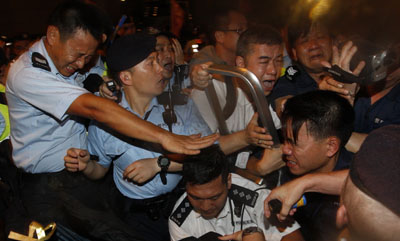As a former resident of the Special Administrative Region, the classification given Hong Kong when it reverted to China’s control in 1997, I’ve always watched the media there with the appreciative eye of a news consumer. The concept of “One Country, Two Systems,” put forward to explain how the former British colony’s capitalist economy and post-colonial administration were going to mesh with China’s authoritarian government, was always suspect. A major concern was that China would eventually have to crack down on Hong Kong’s free-wheeling media.
It turns out the skepticism was well-placed. Freedom of expression is deteriorating as Beijing “has been taking a more aggressive role” in its attitude toward the SAR, according to the most recent report from the Hong Kong Journalists Association.
But that slow, steady disintegration of media freedom in the past 14 years since Hong Kong reverted to Chinese control accelerated when police cracked down on a July 1 demonstration that carried over into the early hours of July 2. Hong Kong Journalists Association chairwoman, Mak Yin-ting sent a letter to Police Commissioner Andy Tsang Wai-hung saying that police used pepper spray against at least 19 journalists.
On Wednesday, Hiu-yeung Chong, HKJA’s general secretary, sent me an update on the aftermath of the July 1-2 situation, which I’ve pasted below. I think it is appropriate to see this crackdown as an acceleration in media restrictions in Hong Kong and part of China’s much broader crackdown on voices of dissent that has roughly paralleled the Arab Spring uprisings in the Middle East and North Africa. CPJ’s senior researcher Madeline Earp has written about it frequently; see China’s media crackdown to start digging into the coverage she’s pulled together in past months.
Here’s Hiu-yeung Chong’s message:
At least 19 Hong Kong reporters were pepper-sprayed by police during a huge demonstration against the Hong Kong government on July 1. At least two reporters were sprayed directly in the face at close range. Kiri Choy, an intern reporter for New York-based New Tang Dynasty TV was arrested and later released after the Hong Kong Journalists Association (HKJA) pressed the police to drop all charges against her.
The police action came at the end of the second biggest demonstration in Hong Kong since 2003. The protest focused on the rapid erosion of Hong Kong people’s right to freedom of expression, with the government specifically planning to remove the people’s right to express their choice of candidates in by-elections to replace legislators who resign or die in office. It’s a move that has angered voters in Hong Kong.
As the massive event drew to a close police suddenly moved in from different directions to trap one particular section of the demonstrators. Many reporters were caught between police and demonstrators with no means of escape. They were swiftly disabled by the pepper spray fired by the police at close range.
The Hong Kong Journalists Association has lodged a strong protest with the police. But so far there has been no satisfactory explanation or justification for the police actions by either the police or the government.
HKJA intends to continue to demand an explanation from the police and the government, along with demands for assurances that such brutal action against journalists will not be repeated.
